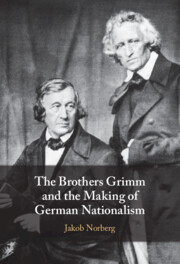The Brothers Grimm and the Making of German Nationalism
In the first comprehensive English-language portrait of Jacob and Wilhelm Grimm as political thinkers and actors, Jakob Norberg reveals how history’s two most famous folklorists envisioned the role of literary and linguistic scholars in defining national identity. Convinced of the political relevance of their folktale collections and grammatical studies, the brothers Grimm argued that they could help disentangle language groups from one another, redraw the boundaries of states in Europe, and counsel kings and princes on the proper extent and character of their rule. They sought not only to recover and revive a neglected native culture for a contemporary audience but also to facilitate a more harmonious and enduring relationship between the traditional political elite and an emerging national collective. Through close historical analysis, Norberg reconstructs how the Grimms wished to mediate between sovereigns and peoples, politics and culture.
Jakob Norberg is Associate Professor of German Studies at Duke University. He is the author of Sociability and Its Enemies: German Political Thought After 1945 (2014) and numerous articles in journals such as PMLA, Cultural Critique, Textual Practice, New German Critique, Zeitschrift für deutsche Philologie, and Sprache und Literatur.

